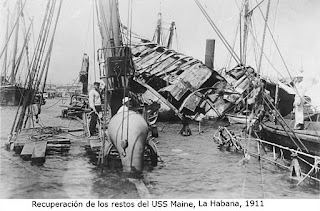On 15th February 1898 the battleship USS Maine
exploded and sank off the coast of Cuba, thus precipitating the
Spanish-American War. However, the facts seem to suggest that this event was
just the excuse that a bellicose American government needed to launch hostilities
that would bring it new colonies at a time when the world’s great powers all
seemed to be intent on grabbing what they could.
Cuba was a Spanish colony but it was undergoing considerable
unrest at the time with native Cubans rebelling against their lamentable
conditions. There was also a sizable American population living there, and it was
in order to reassure them that President McKinley sent the Maine to lie off
Havana and show the Spanish that any aggression against American citizens would
not be tolerated.
During the evening of 15th February a massive
explosion ripped through the front half of the ship which then sank to the
bottom of the harbour, leaving only the bridge and stern above water. Of the
ship’s complement of 350 men, 260 died.
Blame for the explosion was immediately assigned to the
Spanish, not least by the newspaper magnate William Randolph Hearst. With
absolutely no evidence to support his claim, he lambasted the Spanish
colonisers for their act of war against the United States, even publishing
artists’ impressions in his newspaper, the New York Journal, that showed
Spanish saboteurs placing mines on the hull of the Maine.
Hearst sent reporters and a war artist to Cuba to report on
the war then taking place between the colonisers and the Cuban rebels, despite
the fact that there was no such war. When the artist told Hearst that this was
the case, his reply was, “You furnish the pictures, I’ll furnish the war”.
Hearst soon persuaded the vast majority of the American
people that the Maine had been blown up by Spanish terrorists out of contempt
for the United States, and Congress duly demanded that Spain withdraw from
Cuba. When this did not happen, war was declared in April 1898.
The hostilities were very one-sided and Spain was forced
into a humiliating peace treaty within eight months. As a result, the United
States gained control of Puerto Rico, Guam and the Philippines.
Behind it all lay the ominous figure of William Randolph
Hearst, who had engineered a war that cost tens of thousands of lives, most of
them from disease rather than actual combat. Hearst’s motive, although cloaked
in patriotism, was simple naked greed – he merely wanted to increase the
circulation of his newspapers. Hearst’s way of doing business would become a byword
for the criminal manipulation of world affairs by corrupt and immoral
capitalists.
Hearst’s methods were satirised very competently by the
British novelist Evelyn Waugh in his 1938 novel Scoop, although it was British
newspaper owners such as Northcliffe and Beaverbrook that were his principal
targets. However, the idea that powerful press barons could turn fiction into
reality by telling downright lies and persuading gullible people to believe
them, to the extent of world history being changed, surely owes its origin to
Hearst.
As for the USS Maine, the most likely explanation for its
demise was an accidental detonation in a coal bunker, caused by an oversight on
the part of a crew member. One simple mistake was to lead to devastating and
far-reaching consequences.
© John Welford
© John Welford

No comments:
Post a Comment